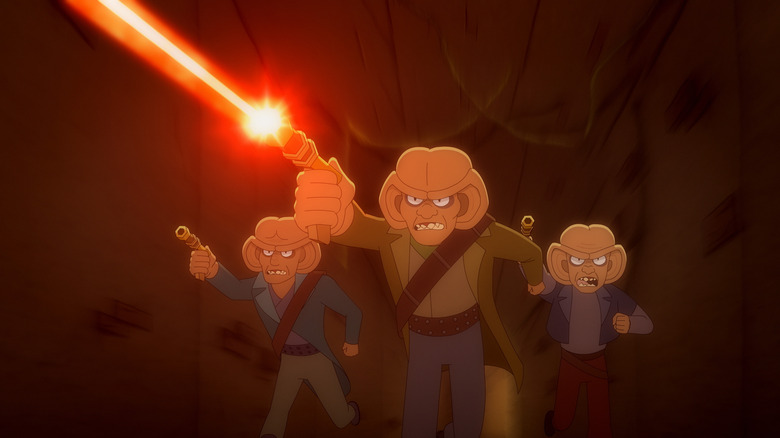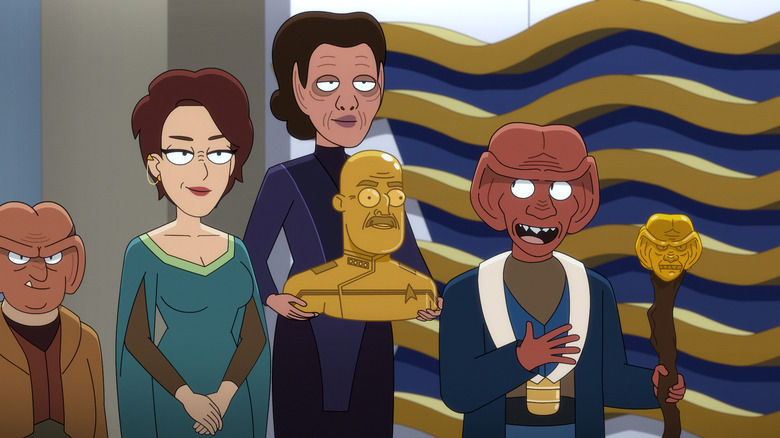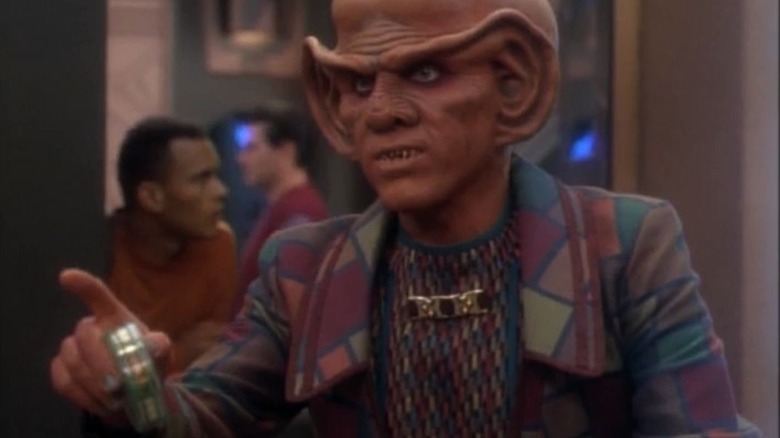How Lower Decks Always Finds The Comedy In Star Trek's Darkest Moments
This post contains spoilers for the latest episode of "Star Trek: Lower Decks."
In the latest episode of "Star Trek: Lower Decks," called "Parth Ferengi's Heart Place," Lieutenant Mariner (Tawny Newsome) is taking full advantage of her latest mission. She has been assigned to the Ferengi homeworld Ferenginar to visit the local bars and review them for a Starfleet travel guide. Uninterested in the actual work, Mariner drinks to excess and gets in a bar fight with some unassuming Ferengi bikers. She is arrested, natch, but bailed out by her Ferengi friend Quimp (Tom Kenny).
After the scrum, Mariner and Quimp go for a walk in the rain, she still drunk, and he furious at her foul behavior. He finally confronts her about her self-destructive tendencies. Quimp points out that Mariner was raised in Starfleet with every possible advantage, yet still feels the hurtful need to get drunk regularly and fistfight strangers. This is a sobering moment for Mariner, who more often describes herself as a scrappy rogue.
This conversation takes place in a somber location, right next to a war memorial. The memorial consists of hundreds of names in a long digitized list. It's a memorial to what was lost in the Dominion War, the conflict dramatized in detail on "Star Trek: Deep Space Nine." However, because Ferengi society is arranged entirely around the acquisition of profit and the worship of capital, the memorial is a little different than the ones we might see on Earth. Quimp points out that the list on the memorial is the sum total of cash lost during the war. A visiting Ferengi tourist looks at the numbers as weeps. So much money, just gone.
What initially seems like a bleak moment about loss is transformed into a gag about Ferengi values. Kudos to the "Lower Decks" writers for constructing such a moment of wit.
Ferengi values
This author has always admired the Ferengi on "Star Trek," at least when they were written as dignified and principled characters. Quark (Armin Shimerman) on "Deep Space Nine" is one of the show's best characters, as he is intelligent, shrewd, and willing to stand up for what he believes in. Being a Ferengi, however, Quark just happens to believe in the opposite of what "Star Trek" typically stands for. The Ferengi's worship of money informs every aspect of their lives. They charge people to come into their homes. Their holiest book is a list of 285 aphorisms devoted to acquisition. Even their afterlife involves an entry fee.
Throughout "Deep Space Nine," Quark, and other Ferengi, were willing to lie, cheat, and steal to acquire more wealth. They exploited their workers, skimmed wages, and overcharged for shoddy goods. When one sees, however, that Ferengi are doing this as a matter of honor and not to be conniving, an element of respect enters the equation. I don't like what Quark did, but I admire that he abided strongly and vocally to his personal devotion to money. Integrity is all.
So it does make sense that the Ferengi war memorial would be less about the fallen soldiers or the murdered civilians and more about the waste of money. A Ferengi wouldn't necessarily be moved by the death of a long-ago fallen soldier. When Ferengi die, they are cremated, pieces of them are sealed in containers, and the containers are sold at bars and restaurants. A corpse is just a trinket to purchase. The money itself is the important thing.
Rules of Acquisition #34 and #35
This war memorial gag highlighting reversed principles is more than a clever joke, however. It reveals that the prolonged and bloody Dominion War was far more costly than one might have initially known. Expanded universe lore puts the ultimate death toll of the Dominion War somewhere in the neighborhood of 1.084 billion people, most of them Cardassians. 91 million of those were Federation citizens. "Deep Space Nine" showed what happened when the ordinarily effective tactic of Federation diplomacy breaks down. The tragedy was unbearable.
The Ferengi, meanwhile, take a more pragmatic approach to war. They are willing to enter a conflict center and make money off of it however they can. In the old days, they brokered weapons (illegal since Rom became Grand Nagus), medicine, food, and whatever they could sell. The Ferengi Rule of Acquisition #34 states "War is good for business." By that same token, once the war has ended and rebuilding needs to be done, Ferengi merchants will appear with rebuilding tools, transports, and whatever they can sell. Rule of Acquisition #35 states that "Peace is good for business."
It seems that the Dominion War, however, contradicted Rule #34. This was a war so terrible that is wasn't good for business. Indeed, it was ultimately damaging to the economy of Ferenginar. That, for a Ferengi, would make it the most devastating conflict in history. Yes, many people died, but no money was made from their deaths. The Ferengi tourist was right to cry. This was cost over a billion lives, but — o woe! — think of the latinum.


